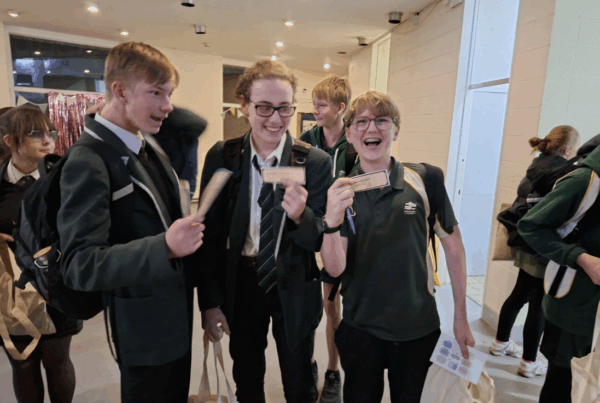
Ben Levi is a Lead Practitioner for MFL and leads on Equality, Diversity and Inclusivity. He is the co-author of the Sentence Builders Trilogy series speaking books, and creates online content for language teachers and learners.
For more from Ben, follow him on X @bengeorgelevi or on Facebook – Ben Levi Languages.
As teachers, we step into the classroom every day with a sense of purpose: to inspire, challenge, and guide our students. We take pride in our ability to plan effective lessons, deliver engaging content and help young people navigate the often very challenging terrain of learning. But as much as we dedicate ourselves to the development of our students, how often do we pause to consider our own development as educators?
I have always believed that teaching is as much a journey for us as it is for our students. No matter how experienced we become, we are never the finished product. The moment we think we couldn’t possibly learn from a CPD session or that we’ve mastered every technique is the moment we risk becoming stagnant. The truth is: education, like life, is dynamic. To keep fresh, we need to be adaptable, reflective and open-minded in our own professional growth—basically…be humble!
Teaching is a constantly changing landscape
Teaching is not static—it evolves. In the world of MFL, for example, the expectations of linguistic fluency, cultural understanding, and pedagogical approaches are in constant motion. New research into cognitive science and second language acquisition emerges all the time, offering new perspectives on how we can improve students’ language retention, motivation, and fluency.
Meanwhile, the tools at our disposal are changing rapidly too. Technology is no longer an optional extra; it’s integral to the way we teach and learn. Platforms for authentic language experiences, tools for more efficient and effective feedback, resources that engage through gamified techniques are transforming our classrooms.
If we become too rigid in our practice—relying on “what has always worked” (I’ve heard this phrase used far too often!)—we risk losing the opportunity to grow, and, more importantly, to give our students the best learning experience we can offer.
Adaptability is a superpower
Being adaptable doesn’t mean we abandon tried-and-tested strategies. It means we balance the wisdom of experience with the curiosity to try something new. It’s about being brave enough to experiment, reflect on what works, and refine our approaches.
For me, adaptability often starts with questions:
- Could this method better engage my students?
- How might a small tweak to this activity improve accessibility or lead to better outcomes?
- What can I learn from others who approach teaching differently?
Adapting our practice might mean integrating a new strategy for vocabulary retention (Eg. Chunking or drilling in a multifaceted way in EPI -Extensive Processing Instruction), experimenting with retrieval practice, or even learning how to utilise online platforms effectively. It can feel uncomfortable at times—we don’t always know if a new method will “work”—but growth rarely happens in our comfort zone.
Open-mindedness: learning from each other
One of the most rewarding parts of being a teacher is the opportunity to learn from one another. Collaboration is a powerful driver of professional growth. Whether it’s attending CPD sessions, participating in coaching, or simply sharing ideas with colleagues over a coffee, we gain fresh perspectives that can transform our practice. A consideration that is often overlooked is the role new teachers can have in this. Their fresh ideas, up-to-date research, and enthusiasm should be shared and they should be empowered to do so.
As MFL teachers, we champion open-mindedness and curiosity in our students. We encourage them to explore other cultures, see the world from different viewpoints, and embrace the joy of lifelong learning. We owe it to ourselves to do the same.
So let’s ask ourselves:
- Are we attending CPD with an open mind, ready to explore ideas that challenge us?
- Do we create space for reflection, asking how we can be even better?
- Are we sharing our successes and failures with colleagues, fostering a culture of collective growth?
The best teachers I know are not those who claim to have all the answers, but those who are constantly seeking them. They are open-minded, reflective, and humble enough to know there is always more to learn.
We grow because our students deserve it
Ultimately, this journey of professional development is not about us—it’s about our students. They deserve teachers who are committed to growth, who are willing to adapt and who never stop learning.
We teach our students that mistakes are part of the learning process. Shouldn’t we model the same? It’s okay if a new strategy doesn’t land perfectly the first time; it’s about trying, reflecting and improving.
As teachers, we have the privilege of shaping lives. And to do that well, we must first shape ourselves.
So, let’s embrace the mindset that we are always learning. Let’s seek out opportunities to develop, to challenge ourselves and to grow. Because we are never the finished product—and that’s what makes this profession so exciting.
To conclude…
How will you challenge yourself to grow this term? Whether it’s attending a CPD session, collaborating with a colleague, or trying a new teaching strategy, take a step outside your comfort zone. Your students—and your future self—will thank you for it.



